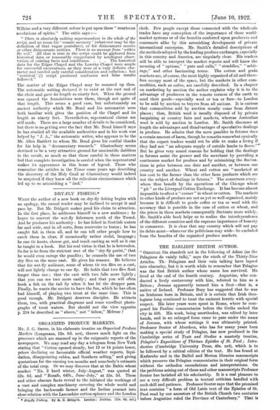ORGANIZED PRODUCE MARKETS.
MR. J. G. Slum, in his elaborate treatise on Organized Produce Markets (Longmans, 12s. 6d. net), throws much light on tho processes which are summed up in the enigmatic reports of the newspapers. We may read any day a telegram from New York stating that " Cotton opened steady, but 12 or 14 points lower, prices declining on favourable official weather reports, liqui- dation, disappointing cables, and Southern selling," and giving quotations for the ensuing ten months and somebody's estimate of the total crop. Or we may discover that at the Baltic wheat market " No. 2 hard winter, July-August," was quoted at 52s. 6d. and " Rosafe, 641b., June-July," at 55s. 3d. These and other obscure facts reveal to the initiated the workings of a vast and complex machinery covering the whole world and bringing the backwoods farmer and the Indian peasant into close relation with the Lancashire cotton-spinner and the London • Dry-fly Fishing. By B. C. Bridgett. London : Jenkins. flOs. gd. net.]
clerk. Few people except those connected with the wholesale trades have any conception of the importance of these world- market systems or of the benefits conferred upon producers and consumers alike by this astonishing development of private international enterprise. Mr. Smith's detailed descriptions of the methods adopted by the leading produce exchanges, especially in this country and America, are singularly clear. His readers will be able to interpret the market reports and will know the meaning of " options," " puts and calls," " straddles," " arbit- rage," and other fascinating terms. The cotton and grain markets are, of course, the most highly organized of all and there- fore occupy most of the space, but the markets in other com- modities, such as coffee, are carefully described. In a chapter on marketing by auction the author explains why it is to the advantage of producers in the remote corners of the earth to send their goods—especially wool or tea or furs—to London to be sold by auction to buyers from all nations. It is curious that commodities sold by auction usually come from distant places ; thus, British wool is usually disposed of by private bargaining at country fairs and markets, whereas Australian wool is sold by auction in London. Mr. Smith discusses at length the advantages and disadvantages of speculative dealings in produce. He admits that the mere gambler in futures does a certain amount of harm, though he remarks somewhat cynically that the expert traders would not be able to make a living if they had not " an adequate supply of outside lambs to flecee."'" But he gives very sound reasons for holding that the dealings in futures assist the grower and the merchant by providing a continuous market for produce and by minimizing the fluctua- tions in price between one date and another, or between one country and another. Wheat and cotton are " marketed at less cost to the farmer than the other farm products which are not the subject of dealings in futures." The consumers every- where thus benefit by the operations of the Chicago wheat " pit " or the Liverpool Cotton Exchange. It has become almost impossible to effect a " corner " in wheat or cotton. The markets in other kinds of produce are not as yet so well organized, mainly because it is difficult to grade coffee or tea or wool with the accuracy that is possible in the case of cotton or wheat, and the prices in these markets consequently fluctuate more widely. Mr. Smith's able book helps us to realize the interdependence of the different countries and the supreme importance of honesty in commerce. It is clear that any country which will not pay its debts must—whatever the politicians may wish—be excluded from the benefits of the organized produce markets.


































 Previous page
Previous page